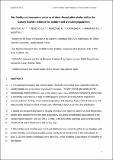Site fidelity and movement patterns of short-finned pilot whales within the Canary Islands : evidence for resident and transient populations
Abstract
1. The geographic location and oceanographic, physical, and chemical water properties make the Canary Islands one of the planet's biodiversity hotspots. The short‐finned pilot whale (Globicephala macrorhynchus) is one of the archipelago's most commonly encountered species and is potentially vulnerable to a range of anthropogenic pressures, including habitat degradation, acoustic pollution, fishing, whale‐watching operations, and shipping. Assessment of impact has not been possible because of a lack of even basic information about occurrence and distribution. 2. Spatial and temporal distributions, ranging behaviour, and residence patterns of short‐finned pilot whales were explored for the first time using survey and photo‐identification data collected in the Canary Islands between 1999 and 2012. In total, 1,081 pilot whale sightings were recorded during 70,620 km of search effort over 1,782 survey days. 3. Pilot whales were detected year round and distributed non‐uniformly within the archipelago, with greater densities concentrated in patchy areas mainly on the leeward side of the main islands. In total, 1,320 well‐marked individuals were identified, which exhibited a large degree of variability in site fidelity. 4. Different but not isolated subpopulations of pilot whales that share ranges and maintain social interactions were apparently present in the Canary Islands. Strong evidence of an island‐associated subpopulation was found, with a group of 50 ‘core resident’ individuals associated particularly with Tenerife. There were also ‘transient’ individuals or temporary migrants, which, probably driven by inter‐ and intra‐specific competition, may travel long distances whilst using the archipelago as part of a larger range. 5. These findings fill a major gap in the knowledge of this species’ occurrence, distribution, movements, and site fidelity in the archipelago and provide much needed data to allow the initiation of informed conservation assessments and management actions.
Citation
Servidio , A , Pérez-Gil , E , Pérez-Gil , M , Cañadas , A , Hammond , P S & Martín , V 2019 , ' Site fidelity and movement patterns of short-finned pilot whales within the Canary Islands : evidence for resident and transient populations ' , Aquatic Conservation: Marine and Freshwater Ecosystems , vol. 29 , no. S1 , pp. 227-241 . https://doi.org/10.1002/aqc.3135
Publication
Aquatic Conservation: Marine and Freshwater Ecosystems
Status
Peer reviewed
DOI
10.1002/aqc.3135ISSN
1052-7613Type
Journal article
Description
Funding: co-funded by the Canary Government (Consejería de Política Territorial, Sostenibilidad y Seguridad), the Spanish Government (Fundación Biodiversidad and Ministerio de Medio Ambiente, Medio Rural y Marino), Fundación La Caixa, and by a number of international projects funded by EU programmes MACETUS (FEDER/INTERREG III-B MAC/4.2/M10), EMECETUS (FEDER/INTERREG III-B56105/MAC/4.2/M10), LIFE (LIFE03NAT0062), INDEMARES LIFE+ (LIFE07/NAT/E/00732).Collections
Items in the St Andrews Research Repository are protected by copyright, with all rights reserved, unless otherwise indicated.

